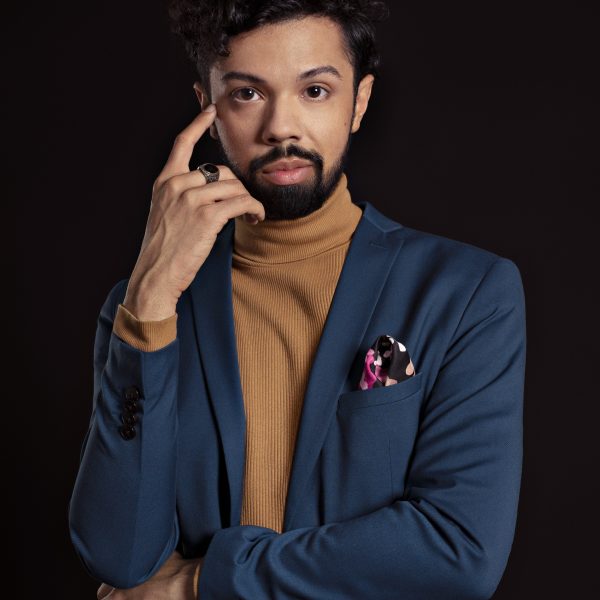This website uses cookies so that we can provide you with the best user experience possible. Cookie information is stored in your browser and performs functions such as recognising you when you return to our website and helping our team to understand which sections of the website you find most interesting and useful.
Bruno de Sá
Biography
Bruno de Sá … astounding … with a high register of soprano purity.(…) A true male soprano able to command thrillingly ringing tones … capable of exquisite cantabile incorporating a ravishing mezza voce.’
[Opéra magazine]
Brilliant young male soprano Bruno de Sá already has a string of glowing reviews to his name, his extraordinary voice and rare musicianship astonishing professionals, critics and public alike.
2015 saw his major role début, as Sesto in Mozart’s La clemenza di Tito at the Teatro São Pedro in São Paolo: “… a triumph … an international career awaits …” [concerto.com.br]. During the 2016/17 season he returned to the Teatro São Pedro as Gherardino (Gianni Schicchi), Harry (Albert Herring), Cherubino (Le nozze di Figaro) and First Lady (Die Zauberflöte). At the 20th Festival Amazonas de Ópera he was the Shepherd in Tannhäuser, and soloist in Triunfo da Voz, a concert celebrating the great castrato Farinelli: “Bruno de Sá drove the audience wild …” [L’Opera].
In 2019 Bruno de Sá made his European debuts impressing the greater number with his interpretation of Aci in Bononcini’s Polifemo under the musical direction of Dorothee Oberlinger (Musikfestspiele Potsdam Sanssouci and Margravial Opera House in Bayreuth). During the season of 2019/20, Bruno de Sá joined the young artist programme at Theater Basel where he sung Die Kleine Meerjungfrau in Jherek Bischoff’s Andersens Erzählungen conducted by Thomas Wise (world première), and Barbarina in Le Nozze di Figaro conducted by Christian Curnyn. He sung Sesto in Handel’s Giulio Cesare directed by Peter Konwitschny (Oper Halle), as well as Isacio in Hasse’s Irene with the Helsinki Baroque Orchestra (Musiikkitalo Helsinki and Theater an der Wien).
Over the following seasons, he returned to Bayreuth to sing Berardo in Porpora’s Carlo il Calvostaged by Max Emanuel Cenčic (Bayreuth Baroque Opera Festival). Later, he took on the role of Abel in Scarlatti’s Il Primo Omicidio conducted by Philippe Jaroussky (Opéra de Montpellier and Whitsun Festival in Salzbourg), as well as Volusio in Hasse’s Cajo Fabricio with {oh!} Orkiestra (Gliwice and Vienna). At the end of the season, he sang Nerone in Handel’s Agrippina staged by Staffan Waldemar Holm and conducted by Francesco Corti (Drottningholm). He also sung Cleopatra in Hasse’s Marc’Antonio e Cleopatra with {oh!} Orkiestra conducted by Martyna Pastuszka (Katowice, Dortmund), as well as Farnaspe in Graun’s Adriano in Siria under the direction of Dorothee Oberlinger, a production to be presented at the Schloßtheater Sanssouci in Potsdam.
Recent engagements include Bruno’s role debut as Orfeo in Gluck’s Orfeo ed Euridice and Sesto in Gluck’s La Clemenza di Tito, both conducted by Michael Hoffstetter (Gluckfestspiele). He also joined Sehnsucht, a Baroque pasticcio directed by Andreas Rosar and conducted by Philip Armbruster (Oper Dortmund), Aminta in Handel’s Aminta e Fillide conducted by George Petrou (Händel-Festspiele Göttingen), pasticcio Siface with the Capella Cracoviensis conducted by Jan Tomasz Adamus (Opera Rara Festival Krakow), Pergolesi’s Stabat mater conducted by Reinhard Goebel (Verbier Festival), Cleofide in Vinci’s Alessandro nell’Indie directed by Max Emanuel Cenčic and conducted by Martyna Pastuszka (Bayreuth Baroque), and Stephano in Gounod’s Roméo et Juliette directed by Eric Ruf and conducted by Pierre Dumoussaud (Opéra de Rouen Normandie). Bruno has also toured various solo programmes across Europe developing fruitful collaboration with renown ensembles such as il pomo d’oro led by Francesco Corti, Les Accents under the direction of Thibault Noally, nuovo barocco under the direction of Dimitris Karakantas, or Dorothee Oberlinger and her Ensemble 1700. Other concert appearances include a concert programme at the Essen Philharmonie (Ruben Dubrowsky) and a Gala concert at the Vienna Staatsoper alongside Baroque stars such as Cecilia Bartoli and Max Emanuel Cenčic.
The emerging star soprano will launch the 2024/25 season with Grain of the Voice, a modern pasticcio staged by Ligiana Costa and conducted by André Dos Santos (Theatro São Pedro, Brazil). He will sing his first Oberto in Handel’s Alcina alongside Francesco Corti and il pomo d’Oro (Théâtre des Champs-Élysées in Paris, Teatro Real in Madrid, and Theater an der Wien in Vienna). Another highlight of the season will be his debut at the Komische Oper Berlin singing the role of Donna Elvira in Mozart’s Don Giovanni in a staging signed by Kirill Serebrennikov and under the baton of James Gaffigan.
Bruno de Sá distinguished himself receiving the OPER! Award 2020 and the ForumOpéra trophy 2022 in the category “Best Newcomer of the Year”. In 2024, he also received the Austrian Music Theatre Prize for his performance of Aminta in Innsbruck Early Music Festival’s production of Vivaldi’s L’Olimpiade conducted by Alessandro de Marcchi.
As an Erato / Warner Classics exclusive artist, his first solo album Roma Travestita was released in September 2022, receiving praise from press and public alike across the globe. The programme was presented with great success in Versailles, Rouen, Bayreuth, Ambronay, São Paulo, Izmir, Cremona, Vilnius, and Buenos Aires.
In October 2024, Bruno will release Mille Affetti, a second solo album dedicated to Mozart and his contemporaries, a project in collaboration with Jarek Thiel and the Wrocław Baroque Orchestra. The initial concert tour will include the Cavatina Hall (Bielsko-Biała), NFM (Wrocław), Teatro del Maggio Musicale (Florence), Ahmed Adnan Saygun Art Centre (Izmir), Chapelle Corneille (Rouen), Château de Versailles (Versailles), Liszt Ferenc Academy odf Mucic (Budapest), and the Markgräfliches Opernhaus (Bayreuth).
(2024_25 Please use this CV exclusively.)









